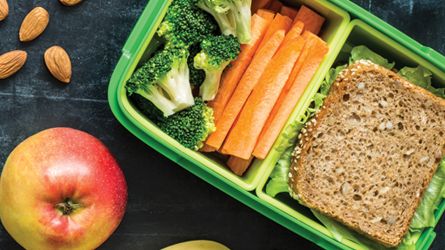
Press release -
One in four South African preschoolers is overweight or obese. What does the research reveal?
The 2016 Healthy Active Kids South Africa (HAKSA) Report Card – coordinated by the Sports Science Institute of South Africa (SSISA), supported by Discovery Vitality – evolves from a collaborative effort of universities and institutions around the country with over 30 representatives formulating the final report. An important advocacy document, the report card grades various aspects of activity and eating behaviour in South African children and youth aged 6 to 18. Developed according to available research, the report builds on the evidence gathered for previous report cards in 2007, 2010, and 2014. The overall grade for Healthy Active Kids South Africa Report Card is a ‘C’ for overall physical activity and ‘D’ for overweight and obesity.
“On a global scale, less than 20% of children and youth are meeting recommendations for physical activity, and for the first time in history, there are more children who are overweight and obese, compared to those who are under-nourished or stunted,” says Professor Vicki Lambert, who has spearheaded the South African report card initiative since its inception in 2007. “Both these challenges are robbing children of reaching their full potential, and both demand our urgent attention.”
In South Africa, the picture isn’t much brighter. The report reveals that:
- Malnutrition is rife: One in four preschoolers is overweight or obese while one in five is stunted. 74% of children in rural settings are underweight.
- More than half of primary school children tested below average for motor control skills. Motor proficiency is linked to academic performance.
- Less than half of children play sport and few do physical education at school; often environments aren’t conducive.
- South African teens consume more than one soft drink per day, and three times the recommend amount of sugar per week. High sugar consumption is linked to a host of chronic diseases.
- Most children eat less than one portion of fruit or vegetables per day. The recommendation is five per day.
- There are 30 million consumers of fast food in South Africa, up by 10 million in the last 5 years.
- Children watch TV for an average of three hours and day, with significant numbers watching five hours a day.
UNESCO and the World Health Organization consider it a fundamental human right for children to have the opportunity to participate in sport, physical activity and play; and to achieve the highest attainable standard of health.
“The 2016 HAKSA report highlights the opportunity we have to enable improved health for our children,” says Dr Craig Nossel, Head of Vitality Wellness at Discovery. “If every individual – parent, educator, or member of the public – makes one positive change in the way they eat or move, we can create a revolution that influences our children for the better.”
The Active Healthy Kids Global Alliance is a network of researchers, health professionals and stakeholders who are working together to advance physical activity in children and youth from around the world. The Active Healthy Kids Global Alliance was established in 2014, following the success of the world’s first Global Summit on the Physical Activity of Children in Toronto. South Africa is one of 39 countries around the world who take part in this report card (known as the Global Matrix 3.0) initiative.
“With this report, we look beyond whether or not South Africa’s children and youth are meeting recommendations, and attempt to unpack those factors that contribute to making healthy choices easier, or that may stand in the way,” says Professor Lambert. “In addition to thenine physical activity and ten nutrition indicators of previous reports, we included a new section concerning physical activity and nutritional status in early childhood. This is particularly pertinent given that both under- and over-nutrition adversely affect growth and development.”
Lambert says that a unique feature of the 2016 Report Card is that they are launching it to kids. “We want them to take some ownership in bringing about the changes we need to facilitate healthier lifestyle choices. We want them to feel empowered to call for what is, in fact, their human right.”
The 2016 report card at a glance
| Physical activity indicators | Grade | Highlight |
| 1. Overall physical activity levels | C | At least half of children are meeting global recommendations for physical activity. Efforts are still needed to promote physical activity for girls and teens. |
| 2. Physical fitness and motor proficiency | D | Health-related fitness is fair to poor. More than half of primary school learners perform below average in motor proficiency. |
| 3. Organised sports participation | D | Less than half of South African children and youth take part in organised sport. |
| 4. School physical activity environment | D | Primary school children have relatively low levels of in-school physical activity. Physical Education is not well implemented. |
| 5. Active travel | C | Walking or riding to school is an important daily physical activity for children, but safety is a concern. |
| 6. Sedentary behaviour | F | South African children spend an average of 3+ hours per day in front of a screen. |
| 7. Peer/ family support | C- | There is a general lack of support from families and peers for participation in physical activity. |
| 8. The community and the built environment | C- | Community initiatives and park upgrades are associated with greater physical activity. Plans for greater reach and access are promising. |
| 9. Government strategy, policy and investment | B | More than three-quarters of South African schools are registered for Sports and Recreation South Africa (SRSA) school sports programmes. |
| Nutrition indicators | Grade | Highlight |
| 1. Overweight and obesity | D | Levels of overweight and obesity continue to rise amongst South African children and adolescents. |
| 2. Under-nutrition | C | Under-nutrition in South African children is decreasing at a slow pace, but continues to co-exist with over-nutrition. |
| 3. Fruit and veg intake | D | There’s no improvement in fruit and vegetable intake as a result of the National School Nutrition Programme (NSNP). |
| 4. Sugar-sweetened beverages, added sugar and salty snacks | F | South African teens drink an average of more than one soft drink per day; have a weekly sugar intake three times the recommended amount; and a have higher than recommended salt intake from snack foods alone. |
| 5.Fast food | F | In the last five years, the number of people buying any fast food per month has increased by 10 million, to 30 million. |
| 6. Advertising and media | D | Government legislation controlling marketing of unhealthy foods to children is continually delayed, and advertising of sugar-sweetened beverages in and around schools remains pervasive. |
| 7. National School Nutrition Programme | B | The reach of the programme remains at 9 million children in 341 schools. Improvements in reducing stunting and obesity were seen, but external evaluation is needed. |
| 8. Vegetable gardens | C | The number of schools with vegetable gardens that contribute to the National Schools Nutrition Programme (NSNP) remains stable (around 8800). |
| 9. Food insecurity | D | The challenge of food insecurity and childhood hunger, juxtaposed with obesity, is ongoing. |
| 10. Early childhood nutritional status | D | Nearly one in four preschoolers is overweight or obese and one in five is stunted. |
“The solutions to better health for our children lie in our own hands, in mutual accountability, from parent to child, educator to families, government to schools and communities, and international trade environment and international agencies to member states,” says Professor Lambert.
ENDS
Notes to editors:
Pick n Pay supports HAKSA launch. Our youth scored a ‘D’ for fruit and vegetable intake on the 2016 Healthy Active Kids report card. This means that despite the National School Nutrition Programme, there has been no improvement since the 2014 HAKSA report card. On 24th May 2017, to support the launch of the Healthy Active Kids SA report card, Pick n Pay will have free fruit available for children at select stores across South Africa.
Parkrun promotion. Parkrun takes place every Saturday at 08h00 at over 100 venues across South Africa. Discovery Vitality members can earn 300 Vitality points throughout the year and in celebration of Youth Month we encourage families to get outside and get active. On Saturday 17th June 2017, Discovery Vitality will offer kids between 6 and 18 on Vitality double points for completing a 5km parkrun.
Get back into the kitchen and cooking with your kids. Fresh, seasonal ingredients, real nutrition and sustainable eating all come together as part of the Discovery Vitality HealthyFood Studio – proudly launched in partnership with Woolworths and Prue Leith Chefs Academy. The Discovery Vitality HealthyFood Studio has recently launched a Kids Menu, and runs classes for children between 8 and 12 teaching them to prepare nutritious, appetising meals by themselves. During the month of June, Discovery Vitality will be offering 25% off all kids’ classes. Use the promo code HFSKids when booking to redeem the discount.
Topics
Categories
- nutrition
- South Africa
- malnutrition
- World Health Organization
- UNESCO
- child health
- kids health
- physical activity
- Discovery Vitality
- Craig Nossel
- parkrun
- HAKSA
- HealthyFood Studio
- Healthy Active Kids Report Card
- Science Institute of South Africa
- SSISA
- Vicki Lambert
- Active Healthy Kids Global Alliance
- National School Nutrition Programme
- active play
Discovery information
About Discovery Limited
Discovery Limited is a South African-founded financial services organisation that operates in the healthcare, life assurance, short-term insurance, savings and investment products and wellness markets. Founded in 1992, Discovery was guided by a clear core purpose – to make people healthier and to enhance and protect their lives. Underpinning this core purpose is the belief that through innovation, Discovery can be a powerful market disruptor.
The company, with headquarters in Johannesburg, South Africa, has expanded its operations globally and currently serves over 5 million clients across South Africa, the United Kingdom, the United States, China, Singapore and Australia. Discovery recently partnered with Generali, a leading insurer in Europe, and has partnered with John Hancock in the US. These new partnerships will bring Discovery’s shared-value business model to protection industries in Europe and the US.
Vitality, Discovery’s wellness programme, is the world’s largest scientific, incentive-based wellness solution for individuals and corporates. The global Vitality membership base now exceeds three million lives in five markets.
Discovery is an authorised financial services provider and trades under the code “DSY” on the Johannesburg Securities Exchange.
Follow us on Twitter @Discovery_SA







